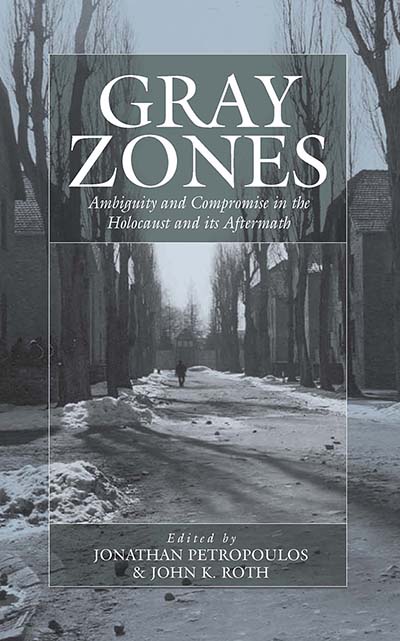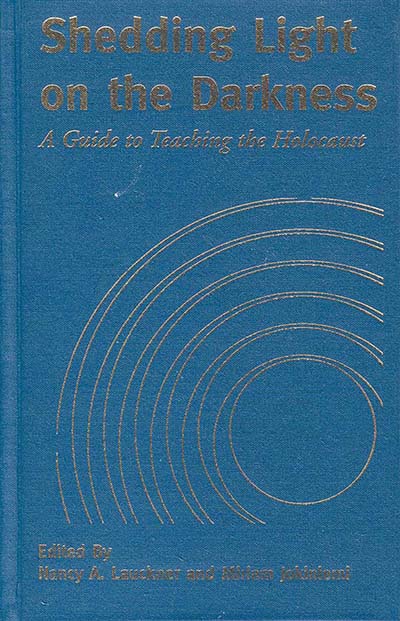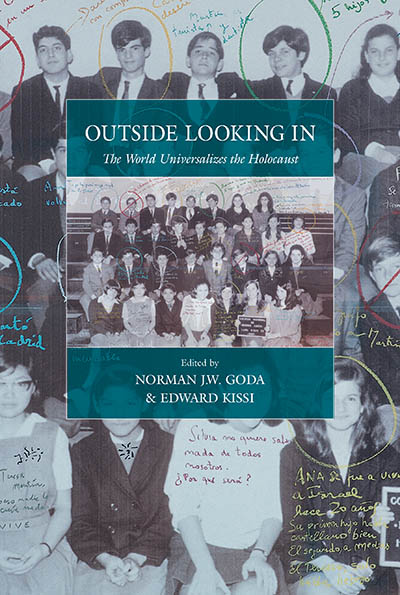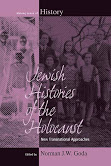
Series
Volume 18
War and Genocide
Email Newsletters
Sign up for our email newsletters to get customized updates on new Berghahn publications.
Judging 'Privileged' Jews
Holocaust Ethics, Representation, and the 'Grey Zone'
Adam Brown
Full Text PDF | Full Text ePUB Made available under a CC BY-NC-ND 4. license with support from Knowledge Unlatched.
234 pages, bibliog., index
ISBN 978-0-85745-991-6 $135.00/£104.00 / Hb / Published (July 2013)
ISBN 978-1-78238-916-3 $19.95/£15.95 / Pb / Published (May 2015)
Reviews
“Brown... deals in detail with the touchiest aspect of the Holocaust, so-called privileged Jews, and he does so with scholarly thoroughness…Highly recommended.” · Choice
"This is a well-written, original, and important book that breaks new ground by providing a detailed analysis of this group of victims, thereby deep-ening our understanding of the Holocaust and our appreciation of the complexities of human nature in extreme circumstances." · Jewish Book Council Review
“Brown’s book benefits readers by raising the familiar but valuable question of choice in impossible situations. More importantly still, it begs the question of whether classic works in literature and film have intentionally or subconsciously influenced audiences’ judgments on how we would like to answer for ourselves. Brown’s well-researched work is a valuable introduction to thinking such questions through and understanding how these questions have been answered by others through their representations of the Holocaust.” · Dialogues on Historical Justice and Memory
“Brown provides an important contribution to Holocaust Studies as he carefully builds upon Primo Levi’s “grey zone” in order to explore the passing of moral judgment by writers and artists on those “privileged” Jews who served their Nazi masters…This is an extremely fine choice for any setting devoted to difficult ethical choices, whether the audience is Jewish or not, whether the reader or sponsoring group is religious or not… a thought-provoking read.” · Association of Jewish Libraries Reviews
“Brown’s work breaks new ground by providing a sustained and detailed analysis of those Holocaust victims who can be called ‘privileged’ Jews… These men and women… have been ‘present’ in many accounts of the Holocaust, but Brown brings that presence to center stage and sheds important light upon it.” · John K. Roth, Claremont McKenna College
“This book makes an important contribution to Holocaust studies, particularly to the study of Holocaust memorial culture, to the study of Holocaust film, to what might be called Holocaust ethics, and, to a certain degree, the analysis of Holocaust testimonies. It is readable and largely jargon-free, thoroughly researched and documented… an excellent piece of scholarship: rewarding and instructive at many turns.” · Oren Stier, Florida International University
“This is an uncommonly well and clearly written book that commands and draws thoughtfully upon a large body of relevant literature….” · Peter Hayes, Northwestern University
Description
The Nazis’ persecution of the Jews during the Holocaust included the creation of prisoner hierarchies that forced victims to cooperate with their persecutors. Many in the camps and ghettos came to hold so-called “privileged” positions, and their behavior has often been judged as self-serving and harmful to fellow inmates. Such controversial figures constitute an intrinsically important, frequently misunderstood, and often taboo aspect of the Holocaust. Drawing on Primo Levi’s concept of the “grey zone,” this study analyzes the passing of moral judgment on “privileged” Jews as represented by writers, such as Raul Hilberg, and in films, including Claude Lanzmann’s Shoah and Steven Spielberg’s Schindler’s List. Negotiating the problems and potentialities of “representing the unrepresentable,” this book engages with issues that are fundamental to present-day attempts to understand the Holocaust and deeply relevant to reflections on human nature.
Adam Brown is a Senior Lecturer in Media Studies at Deakin University, Australia, and a volunteer at the Jewish Holocaust Centre in Melbourne, where he initiated the digitization of the Centre’s survivor video testimony collection. He was awarded the Isi Leibler Prize for the best contribution to advancing knowledge of racial, religious or ethnic prejudice in any time or place for his dissertation, and has written widely on Holocaust representation across various genres, surveillance and film, mediations of rape, digital children's television, and gaming cultures.
Interview with author Adam Brown on New Books Network.
Subject: Genocide HistoryHistory (General)Jewish Studies
Judging 'Privileged' Jews by Adam Brown is available open access under a Creative Commons Attribution-NonCommercial-NoDerivatives 4.0 International License (CC BY-NC-ND 4.0) with support from Knowledge Unlatched.
Full Text PDF | Full Text ePUB
OA ISBN: 978-1-78533-656-0




